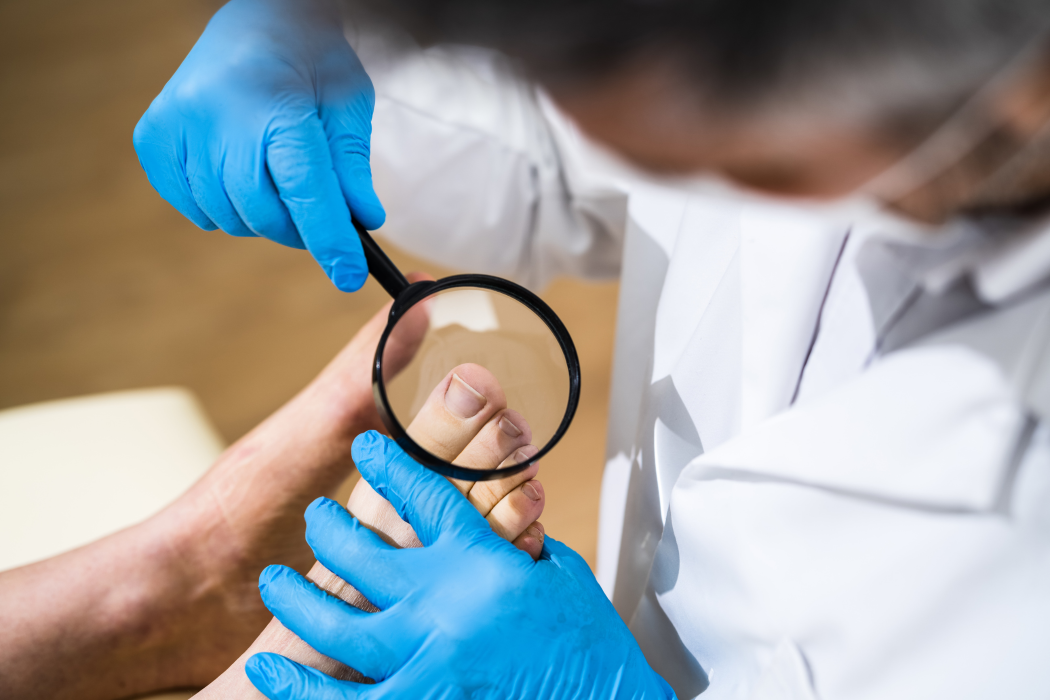

We treat a lot of ingrown toenails here at the Auckland Ingrown Toenail Clinic. So, with approximately 10% or more of the adult population harbouring a fungal nail infection, it’s not uncommon that we see many ingrown toenails where a stubborn nail fungus has also infiltrated the nail. So how can you tell, what can you do, and what complications can arise in terms of treatment when you have both an ingrown toenail and nail fungus? Here’s the low-down from Remuera’s leading podiatry team.
A few key giveaways show you that you may have a fungal nail infection. These include:
In the initial stages of a fungal nail infection, you’ll see changes to the free nail edge (at the tip of the nail), cuticle damage, or changes to the sides of the nail. It’s common to notice white or yellow spots or streaks down the nail. This is usually where most people will wonder why their nail has changed and what could be going on, but are hoping that it will go away on its own just like it appeared, so don’t take any action to treat it (yet).
Unfortunately, it is uncommon for fungal nail infections to clear up without treatment. This is because the fungus has everything it needs to continue growing and thriving on the toenails – it has a big nail to invade paired with warm and moist temperatures when enclosed in footwear. As a fungal nail infection is at its early stages here, it’s actually the simplest to treat, before the damage becomes more extensive.
As the infection progresses, the colour of the nail tends to change. You may see more yellow, white, or sometimes even brown areas. These are all signs of the very real damage that the fungus is inflicting on your nails, and these changes tend to be irreversible – aside from treating the fungus and letting the nail grow out healthy and clear.
As the fungus infects the area beneath the nail, thick nodules are produced, and the nail-thickening process begins. Soft keratin (which has a nail-like texture) can build up between the nail plate and nail bed, ‘islands’ on the nail surface can form, and the nails develop a moth-eaten appearance. These nails are prone to crumbling and splitting and can have jagged edges that catch on socks.
Thickened nails can be tricky to trim without the right tools. They can also cause ingrown toenails! The thickness may create pressure in shoes that can cause pain and discomfort to the toes. This is the stage where we see many of our patients for fungal nail treatment, and ingrown toenails if they have them.
As the fungus causes the nail to thicken, the shape of the nail may become distorted as it separates from the nail bed. You may find yourself with bumpy, curly and oddly shaped nails that have partially or fully separated from the nail bed. This can create a ‘cave’ beneath the nail, where the fungus can continue growing and where traditional creams cannot reach.
At this stage, most patients we’ve treated tend to hide their nails in enclosed shoes and socks. They may have the thickness or the ridges of their nails reduced by a podiatrist (this can help with the appearance temporarily!), but this does not restore the appearance of their nails, it only makes the nails more comfortable until they grow further.
So how are fungal nail infections treated safely and effectively? The thing with fungal nail infections is that, traditionally, they’ve been challenging to treat. When working with living fungal cells and applying the standard creams to the nails daily, it’s easy for things to go wrong – whether that’s forgetting to use the creams or lacquers, or them not penetrating the nail enough or getting under that ‘nail cave’ we described above.
This is why we highly recommend PACT treatment for toenail fungus – a safe and effective treatment that produces the best results for nail fungus that we’ve seen in our years of practice. PACT stands for Photodynamic Antimicrobial Therapy and uses a high-powered LED light paired with a unique gel sensitive to the LED light. Together, they produce antifungal effects that kill the nail fungus (and fungal spores that spread the infection). Better yet, they do so without causing any damage or harm to your toenail or the surrounding skin.
Research on the effects of PACT has found success rates of up to 100% for mild to moderate infections and 63.5% for severe infections. This is significantly better than the range of traditional treatments currently on the market (which can be as low as 7% in some cases).
We love that PACT:
Want to learn more about PACT? Visit our treatment page here.
In some cases, having your ingrown nail infiltrated by fungus may complicate ingrown nail treatment as toenail fungus weakens the nail structure, making it more susceptible to further damage and infection. A nail with changes to its appearance and texture, such as when it is thickened and ridgy, can make the ingrown toenail more painful and difficult to treat. With this said, as Auckland’s leading ingrown nail clinic, our podiatrists have you covered.
We are confident in treating ingrown toenails and fungal nail infections, together or separately, with great results. At your assessment, we’ll discuss all of your options and any complication risks so you stay fully informed. Most people have no issues enjoying a life free of ingrown toenails after their PNA procedure—as well as healthy and clear nails with PACT.
Book your appointment online with our team here, or call us on (09) 523 2333.
.png)
This Mother’s Day, consider a practical, medically safe, and confidence-boosting gift: a professional KeryFlex nail restoration treatment. It’s a simple, effective, and medically safe way to instantly transform the appearance of toenails.

While many of the cases we see here at the Auckland Ingrown Toenail Clinic are fairly standard, there are a few that vary greatly from the ‘norm’, and could have resulted devastating consequences if they had been left untreated under the hopes that the ingrown nail would “go away on its own”, something many people […]

Ingrown toenails can be painful and uncomfortable, so identifying the ‘red flags’ of ingrown nails early on can be helpful in getting prompt treatment and reducing the risk of complications. So what are the top red flags you should be looking out for? One: Persistent Pain and Discomfort One of the most significant red flags […]
Keeping your family on their feet and helping them to walk, run, play and exceed their goals is why we love getting up in the morning.
Ground Floor, One Health Building
122 Remuera Rd, Remuera
Auckland 1050, New Zealand
| MON - FRI | 7:30am – 6:00pm |
| SAT | 8:00am – 4:30pm |
| SUN | Occasionally available |
Make an Appointment
Online Schedule